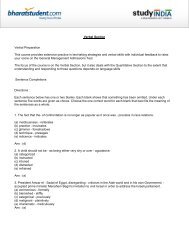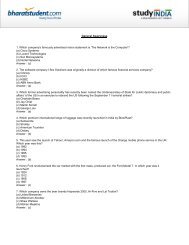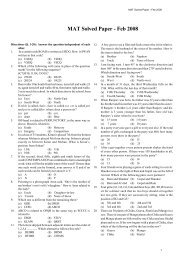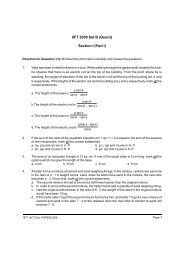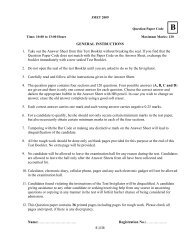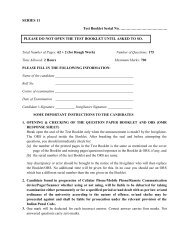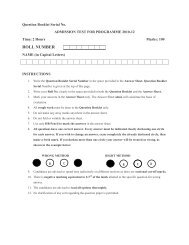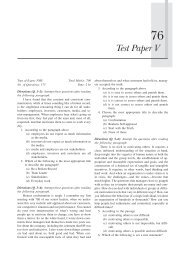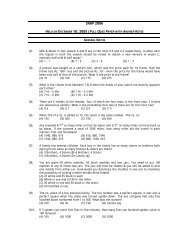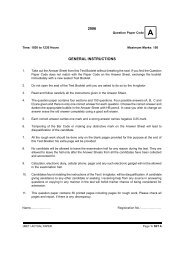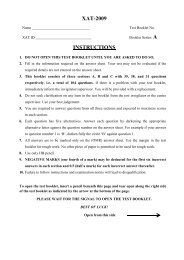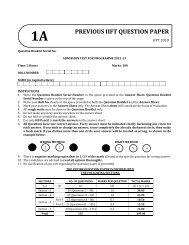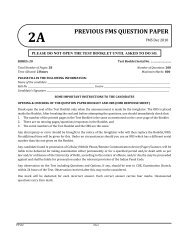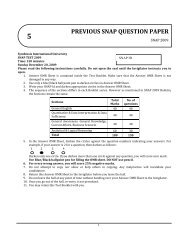You also want an ePaper? Increase the reach of your titles
YUMPU automatically turns print PDFs into web optimized ePapers that Google loves.
Q.30 For years, nuclear-power advocates have claimed that nuclear power is the most<br />
_____________ form of energy available; but in light of a few facts, one begins to<br />
_______________ this claim.<br />
(A) cheap, support (B) useful, question<br />
(C) expensive, contest (D) economical, doubt<br />
Solution:<br />
30. The answer is option (D).Using ‘most’ as a clue we can eliminate (A). Most cheap is a wrong<br />
usage. Between option (B) and option (C): Saying that nuclear power is the most ‘useful’ form of<br />
energy is a little outrageous in most contexts while saying that it is economical holds water.<br />
Whether a thing is useful or not depends on its application whereas being economical does not,<br />
in the context ‘economical’ is an appropriately neutral word. Option (D), ‘contest the claim’ is<br />
not appropriate.<br />
Directions: Questions 31 to 33 relate to the passage given below.<br />
Dear Friend, your letter gently but unmistakably intimates that I am a slacker, a slacker in peace<br />
as well as in war: that when the World War was raging bitterly I dawdled my time <strong>with</strong> subjects<br />
like symbolic logic, and that now when the issues of reconstructing a bleeding world demand the<br />
efforts of all who care for the future of the human race, I am shirking my responsibility and<br />
wasting my time <strong>with</strong> Plato and Cicero. Your sweetly veiled charge is true, but I do not feel<br />
ashamed of it. On the contrary, when I look upon my professional colleagues who enlisted their<br />
philosophies in the war, who added their shrill voices to the roar of the cannons and their little<br />
drops of venom to the torrents of national hatreds, I feel that it is they who should write<br />
apologies for their course. For philosophers, I take it, are ordained as priests to keep alive the<br />
sacred fires on the altar of impartial truth, and I have but faithfully endeavored to keep my oath<br />
of office as well as the circumstances would permit. It is doubtless the height of the unheroic to<br />
worship truth in the bombproof shelter of harmless mathematics when men are giving their lives<br />
for democracy and for public order which is the basis of civilization. But it would be sad if all<br />
the priests deserted their altars and became soldiers, if the Sermon on the Mount were utterly<br />
erased to give place to manuals of bayonet practice or instructions on the use of poison gas. What<br />
avails it to beat the enemy if the sacred fires which we are sworn to defend meanwhile languish<br />
and die for want of attendance?<br />
Q.31 Which of the following is the MOST APPROPRIATE title for the passage?<br />
(A) Philosophy in wartime: An Apologia (B) Philosophy versus War<br />
(C) In defence of Philosophy (D) Philosophy’s quarrels <strong>with</strong> War<br />
Solution:<br />
31. The answer is option (A). This is a letter written by the author to a person who questions the<br />
author about being a passive philosopher. The author takes a very dignified stand and writes a<br />
very sensitive apologia justifying his position in not participating in the war. Apologia means a<br />
work written as an explanation or justification of one's motives, convictions, or acts. It does not<br />
mean apology.



